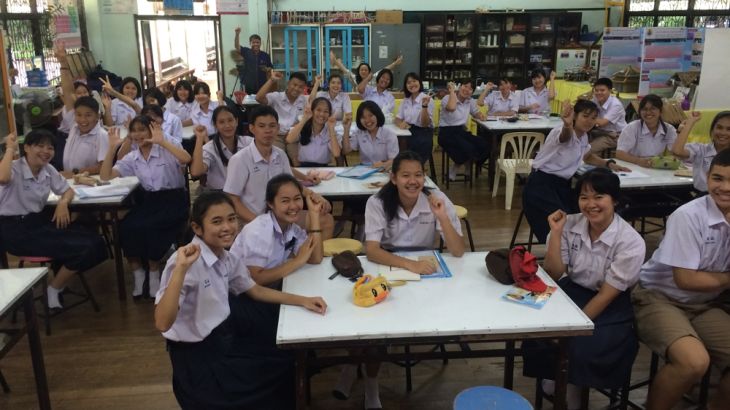
Inspiring Science: Building Thailand’s Future
Can innovative science education turn Thai students into agents of change and boost the country’s economy?
Thailand has seen remarkable social and economic progress over the last four decades.
Thirty years ago, 67 percent of the population lived below the poverty line; by 2014, that number had dropped to 11 percent.
Keep reading
list of 4 itemsPalestinian life under Israeli occupation: An illustrated guideThis article will be opened in a new browser window
Boeing’s jets turn 70: A timeline of highs, lows and turbulence
US university ties to weapons contractors under scrutiny amid war in Gaza
What I'd like to see is knowledge of science being developed in Thailand. Children and adults should learn and understand the nature of science. To see that science is important and it's all around us.
The country spends around 20 percent of its national budget on education, making it one of the highest spenders in the world. However, its international ranking in science and maths education is in the bottom quarter.
Science, technology, engineering and maths have now become a government priority.
Kanchulee Punyain, a Ministry of Education officer, is supporting the government’s push to improve scientific literacy and international performance.
She has worked with a team of teachers and educators across the country to develop the Inspiring Science project, an inquiry and problem-solving approach to teaching science.
The project aims to develop the motivation, achievement and take up of science, technology, engineering and maths by young people across Thailand through innovative pedagogical development, teaching resources, professional development, support and events.
“We want to inspire students to want to learn science … We want the students to fall in love with science, like when we fall in love. You want to do everything for that person. You want to learn,” she says.
Central to the project is engaging students in solving local problems, such as the design of a bridge to replace a rope bridge used by a community in the South of Thailand, the development of floating farms in flooded areas, or to design special candles to be used in candle festivals.
Candle festivals a re very important religious events in Thailand; Thais are famous for their intricately carved candles.
As part of the Inspiring Science project, students are trying to solve an issue affecting many Thai communities: How to prevent the candle sculptures from melting and deforming on hot very days.
The students are tasked with creating a candle wax that won’t melt in the sun, but is soft enough to carve.
“Science is about inquiry and inspiration, searching for new knowledge. This requires students to go out to the community and help to solve problems. What the students gain most are problem-solving skills and working in a team,” says Chalermchai Kaewmaweechai, school principal, says.
Inspiring Science is very different from traditional science teaching.
“In the traditional method, learning is mainly about memorising. Students learn from what the teacher tells them and also from textbooks. In Inspiring Science, students have freedom of thought and develop both sides of their brains. Freedom of thought is important,” says Chalermchai Kaewmaweechai.
The Inspiring Science project develops and supports 15,000 teachers from 7,500 schools across Thailand. Enquiry-based approaches are also introduced to 1,500 kindergartens where the children are taught that asking questions and investigating are the first steps towards being scientific.
“Our aim for the students is to be the scientists of the future in STEM. STEM is Science, Technology, Engineering and Maths. If we can produce more scientists, we can be more innovative and boost the Thai economy,” says Punyain.
In this film, we follow Punyain and a mix of students as they carry out their investigations and then apply their knowledge to solve problems in different communities.
![Kanchulee Punyain has helped develop the Inspiring Science project, an inquiry and problem-solving approach to teaching science [Al Jazeera]](/wp-content/uploads/2016/12/8f6c27be16694aa8b9fecc8ebd1d8606_18.jpeg)